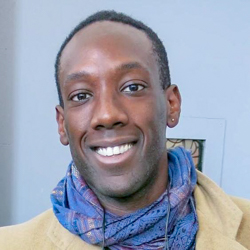George has been awarded a Career Enhancement Adjunct Faculty Fellowship by the Woodrow Wilson National Fellowship Foundation, as well as a Hurst Fellowship for the J. Willard Hurst Summer Institute, and has been selected to participate in the 2019 Law & Society Association Junior Scholars Workshop. George organized a conference titled "Law, Difference, and Healthcare: Making Sense of Structural Racism in Medico-Legal History" at Princeton University. For more on this conference, see https://sites.google.com/view/law-difference-healthcare/home.
George Aumoithe

Ph.D. Candidate Department of History Columbia University
Epidemic Preparedness in the Age of Chronic Illness: Public Health and Welfare Politics in the United States, 1965-2000
"Epidemic Preparedness in the Age of Chronic Illness: Public Health and Welfare Politics in the United States, 1965-2000" examines how the creation of Medicare and Medicaid led to health planning that oscillated between expanding access and containing costs. Federal health planners throughout administrations in the 1970s cut funding to public hospitals and sought to empower state health agencies to authorize new hospital construction and medical services. By the 1980s, state health agencies throughout the states were authorized to continue cost containment policies even though a growing AIDS epidemic soon overwhelmed medical systems. An attempt to formulate a political economy of healthcare on the eve of an epidemic, this dissertation examines shortcomings in public health and welfare provision. A healthcare system focused on chronic disease by the 1960s and cost cutting in the 1970s could not cope with an emergent infectious disease like AIDS.
Read more about George's work here.
Updates
George defended his dissertation and is now Postdoctoral Research Associate at the Shelby Cullom Davis Center for Historical Studies at Princeton.
George Consortium will be a Postdoctoral Research Associate at the Shelby Cullom Davis Center for Historical Studies at Princeton.